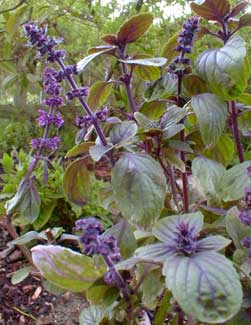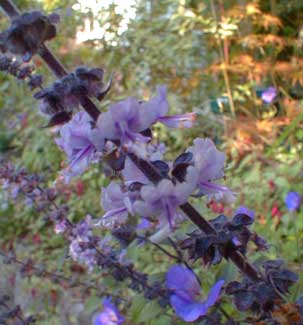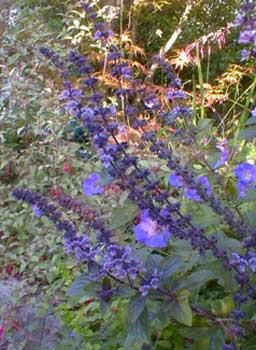
'Magic Mountain'
Sweet Basil
Still is the burthen sung -- "O cruelty,
To steal my Basil-pot away from me!"
-John Keats
(1795-1821)
(1795-1821)
I bought Ocimum basilicum 'Magic Mountain' from a know-nothing vendor at the Ace Hardware nursery department. Its tag did not state its species, & I never suspected the tall, svelt, self-assured saleswoman was a bullshit artist.
 Seeing me looking at a pot of flowering basil, she launched unbidden into a sales pitch. She said this was not as tasty for kitchen use as was sweet basil (she didn't know it is sweet basil), but could be eaten even so. Its main feature, she touted, was how it is fully winter-hardy & would perennialize in Northwest gardens.
Seeing me looking at a pot of flowering basil, she launched unbidden into a sales pitch. She said this was not as tasty for kitchen use as was sweet basil (she didn't know it is sweet basil), but could be eaten even so. Its main feature, she touted, was how it is fully winter-hardy & would perennialize in Northwest gardens.Wow! said I, a perennial basil! I plant them every year, in pots by the kitchen door. But never knew there was a perennial variety!
Cuz there izzunt.
Also, she persisted, completely stoned on her pretence of expertise, this one could be treated more like a drought-hardy sage rather than like sweet basil. As she carried on & on about these startling traits, I was mesmerized into buying it, because wow, a perennial basil with big flowers, what could be more delightful!
But of course it was all B-S, it'll shrivel up if not watered regularly; It'll shrivel up if not watered regularly; & as an annual, as the year progresses & temperatures fall into the 20s, it's kaput.
When I looked up the cultivar at home to find out the species, I quickly realized I'd been duped by a dope, but I didn't mind, you can never have too many basils, & all the different cultivars have distinct flavors. Anyway, any customer fool enough to believe the line of nonsense I was being fed deserves to be duped.
But it suddenly dawned on me this was the same woman who a couple years earlier convinced me that succulent moss-roses were perennials, just like sedums & hardy ice plants. Well, I enjoyed those wonderful annuals anyway, but sometimes I think I'd better learn more about annuals, which I don't ordinarily pay any attention to, just so that such skillful liars can't fool me into buying annuals just by swearing they're perennials.
 'Magic Mountain' has a decent mild flavor, though not especially unique among basils. Since I decided to let this one be a garden flower for its ornamental value, its leafy growth rate was slowed down & I couldn't harvest the leaves as much as I might've if I'd pinched the flowers.
'Magic Mountain' has a decent mild flavor, though not especially unique among basils. Since I decided to let this one be a garden flower for its ornamental value, its leafy growth rate was slowed down & I couldn't harvest the leaves as much as I might've if I'd pinched the flowers.I enjoyed letting this one clump of basil put a lot of its strength in the blooms. It is extremely long-flowering, the first photo up top having been taken in April, the second two photos in September. Because in the past I'd always pinched basils back to maximize leaf production, I had no idea they bloomed so persistently if you let them. But then, many annuals do that.
'Magic Mountain' was developed by Hishtil Nurseries in Israel. It is more heat-tolerant than most basils, just so long as it is kept sufficiently moist. It might be less rapidly injured by short chilly periods. It has an upright rounded form tidier than most basils, except the miniature-leaf varieties that are tidiest. It is one of the best large basils for ornamental value, with its big salvia-like spikes of deepest purple florets, & purple-hued dark green leaves.
O. basilicum is a mint-family herb. It's the species of basil most commonly used for cosmetics, herbal remedies, perfumes, flavor additives for sodas & liqueurs, & is the standard kitchen herb.
It has some fairly potent phytochemicals that give it its lucious flavor & scent, & which might have some credible medicinal applications, having at the very least an antibacterial activity.
A 2004 Chinese study by Fang et al, published the Biological Pharmacological Bulletin, showed that Ocinum essential oils could be mixed with certain medications to fascilitate drug delivery through the skin. Its phytochemicals can also be used as larvicides to repell insects or kill their larvae. Several other uses of the purified oil or specific chemical extracts have solid evidence to back them up, which is not the same as herb vendors claiming dried bits of the plant will cure anything.
Basil also contains a handful of potentially dangeorus compounds, but unless the essential oils are extracted or chemical compounds concentrated, it is in all likelihood as harmless as a toxin as it is worthless as a medicine. The toxins from the whole plant can be more harmful to ruminants (such as cattle) than to people. As a kitchen herb it is one of the most mineral-rich & healthful.
Continue to:
'Red Rubin' Italian Large-leaf Opal Basil